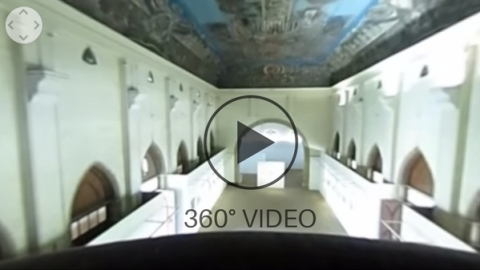
ICFJ Knight Fellow Shaheryar Popalzai, in collaboration with Pakistan's The Express Tribune, has produced the first 360° news video.
Pakistan has made the leap into 360° video. As an ICFJ Knight Fellow, I worked in collaboration with The Express Tribune in Karachi to produce Pakistani media’s first experiment in virtual-reality video.
Why did we do this? Because 360° video is a visual storytelling tool with massive potential — both for planned projects and for live and breaking news. It provides viewers with a more in-depth, immersive experience, giving a first-person perspective on your story.
For our first story, we planned a series on heritage sites in Karachi, Pakistan's biggest city. It boasts hundreds of heritage sites that are rarely visited. We launched a video of Frere Hall, once a town hall and theater and now an art gallery.
At first, we aimed to simply tour this site. But as we filmed, we realized that it had fallen into major disrepair—and our 360° coverage told the story in vivid detail. Cricket players on the field nearby had knocked out windows. Junk collected in the main gallery. Bird droppings littered the stairwell. And paintings, perhaps very valuable, collected dust and debris.
Kamal Siddiqi, longtime editor of Express Tribune and now director of the Center for Excellence in Journalism in Karachi, said that the video was a bold and important step for Pakistani media. “This is a new way of presenting an important story to our readers,” he said. “The Express Tribune has to stay on top of these trends to attract audiences in Pakistan that are increasingly getting news on their mobile phones.”
By running this story, The Express Tribune is using the new tools to tell an important story about our national treasures. We may face difficulties now in getting into other historic sites because the story we did showed how the government is neglecting these sites. But we hope that by using 360° video, we can show the public how important these sites are, and why the government needs to work harder to preserve them.
The videos on the heritage sites are not the only 360-degree videos we have planned. We plan to do others that will look at equally important and untold stories in Pakistan. We’re also looking at sensor projects that will use data as never before in Pakistan. We hope these projects are only the beginning for innovation in Pakistani media.